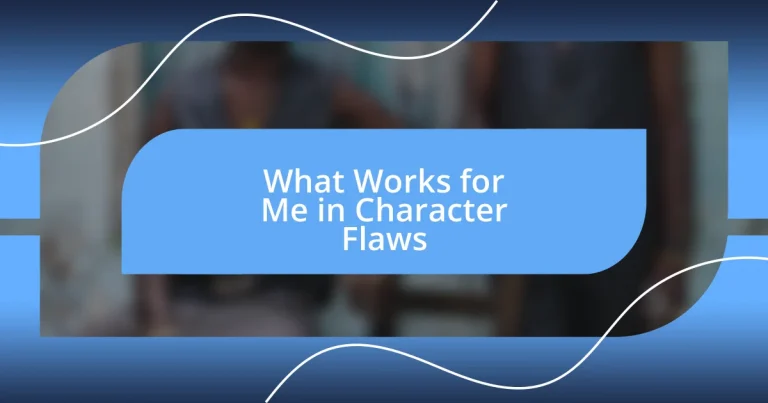Key takeaways:
- Recognizing and understanding character flaws, like impatience and stubbornness, can lead to personal growth and stronger relationships.
- Practical techniques such as setting small goals, seeking feedback, and journaling can help individuals improve their flaws and foster self-awareness.
- Embracing vulnerability and setting boundaries are crucial for personal development, allowing for authentic connections and prioritization of well-being.
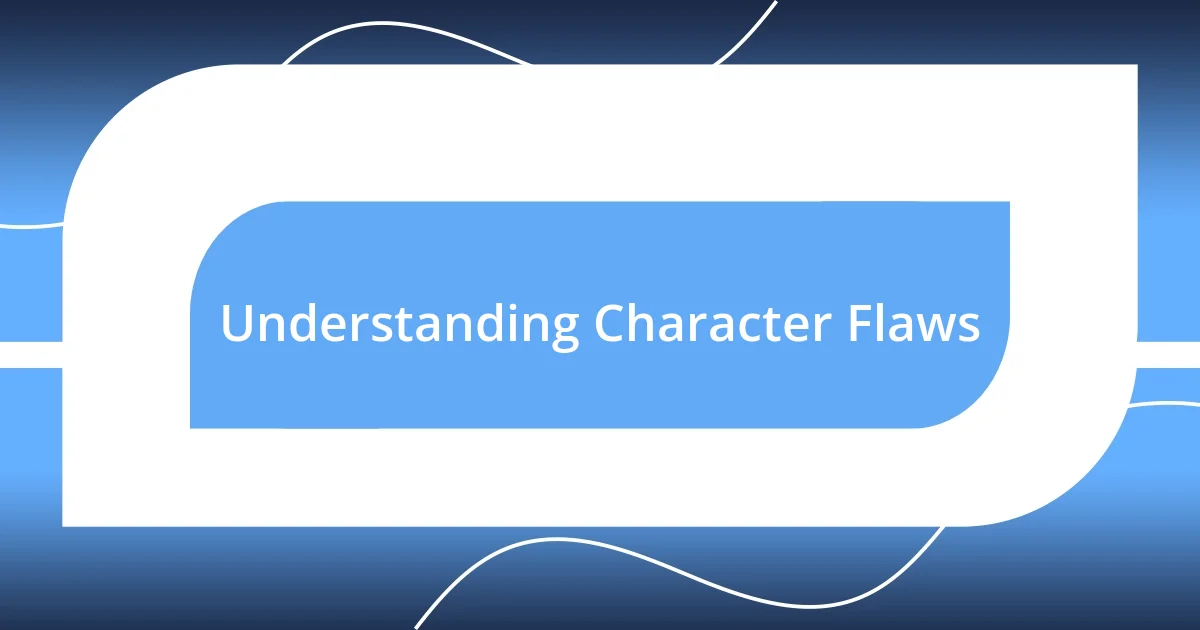
Understanding Character Flaws
Character flaws are traits that reveal our imperfections, the subtle cracks in our otherwise polished exteriors. I remember a time when my stubbornness got in the way of a team project, and instead of collaborating, I dug my heels in, insisting on my way. It’s a humbling experience to realize that these flaws, while often annoying, are also what make us human.
When you think about it, can you really separate the best parts of ourselves from the worst? I’ve come to see my impatience as a double-edged sword; it drives me to meet deadlines but can alienate those around me. This duality is fascinating and shows that character flaws are more than mere imperfections; they shape our interactions, defining the delicate dance of human relationships.
Exploring character flaws allows us to embrace our vulnerabilities rather than shy away from them. For instance, I’ve found that when I acknowledge my flaws, like being overly critical, I actually create space for growth and understanding. Isn’t it empowering to think that facing our imperfections may lead to deeper connections with others?
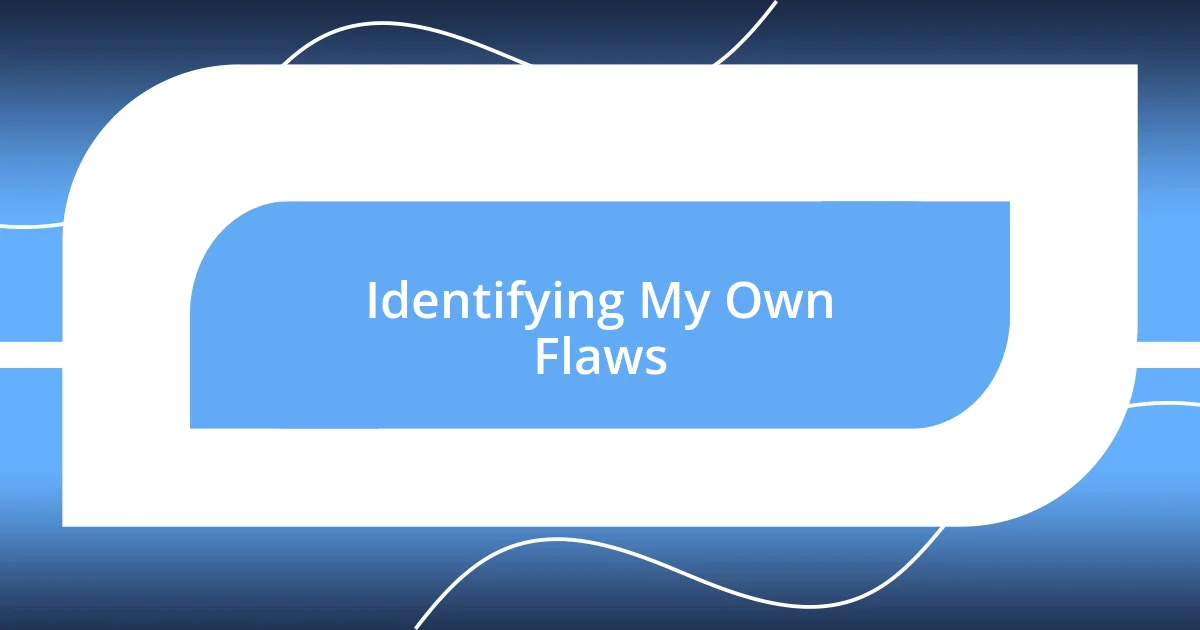
Identifying My Own Flaws
Identifying my own flaws has been quite the journey. I recall a moment when I realized my tendency to procrastinate was holding me back from achieving goals I genuinely cared about. Each time I delayed a task, I felt that knot of anxiety tighten in my stomach, a reminder that avoiding something only deepened my stress.
Another flaw I’ve pinpointed is my struggle with vulnerability. Sharing my emotions often feels daunting, reinforcing an air of aloofness around me. I once missed a chance to connect deeply with a friend because I chose to put on a brave face instead of expressing my true feelings. Looking back, I wish I had let my guard down; it could have transformed our friendship in ways I didn’t anticipate.
Writing this all down has helped me clarify these imperfections. It’s like holding up a mirror and really seeing myself for the first time in years. I’ve realized that these flaws offer insights into my behavior and relationships, helping me understand the person I want to become.
| Flaw | Insight |
|---|---|
| Stubbornness | Sometimes blocks collaboration and growth. |
| Impatience | Pushes me but can alienate others. |
| Procrastination | Increases anxiety and stress, affecting my performance. |
| Lack of vulnerability | Prevents deep emotional connections. |

Learning from Character Flaws
Recognizing my character flaws has truly been a path of discovery. For instance, reflecting on my tendency to overanalyze situations, I’ve found that this can lead to missed opportunities. One time, I hesitated to seize a job offer because I became bogged down in the “what-ifs.” Instead of focusing on the potential growth, I got trapped in self-doubt. This experience taught me that while analysis has its place, it’s crucial to balance deliberation with action.
Here are some insights I’ve gleaned from my character flaws:
– Overthinking: Leads to missed opportunities and increased anxiety.
– Perfectionism: Often stalls progress; it’s better to aim for “good enough” than to get stuck.
– Cynicism: Can cloud my outlook, making it hard to embrace positive experiences.
– Avoidance: When I shy away from uncomfortable conversations, it hinders my relationships.
Each of these areas holds valuable lessons that encourage my growth and help me foster better connections with others. Embracing these imperfections rather than shunning them has transformed my perspective on personal development.
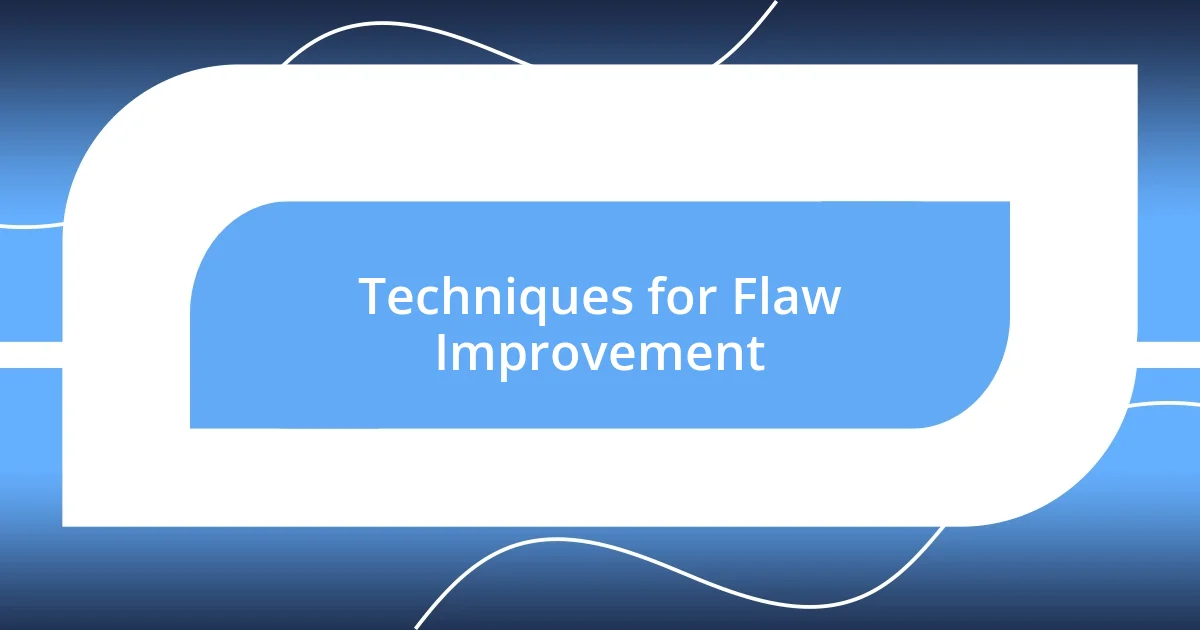
Techniques for Flaw Improvement
Thinking about how to improve my character flaws has led me to some practical techniques. One method that resonates strongly with me is setting small, achievable goals. I remember when I decided to tackle my procrastination by breaking down my to-do list into bite-sized tasks. Initially daunting projects became manageable, and surprisingly, the reward of completing each small task kept me motivated. Have you tried this approach? It might just help you see your progress in a new light, too.
Another approach that’s been transformative for me is seeking feedback from trusted friends. At first, I was nervous about what they might say, but their insights have been invaluable. Once, a close friend gently pointed out my impatience during discussions, which made me realize my eagerness to speak often overshadowed my ability to listen. How enlightening it was to realize that acknowledging this flaw was a step towards becoming a better communicator!
Journaling has also become a go-to technique for improvement. Just recently, I started reflecting on moments when I exhibited cynicism. Writing down my thoughts, I could trace back to underlying fears that prompted my defensive attitude. This process reminded me that vulnerability, though scary, often paves the way for deeper connections. Have you considered journaling as a way to untangle your thoughts? Trust me, it can lead to profound self-discovery and understanding.
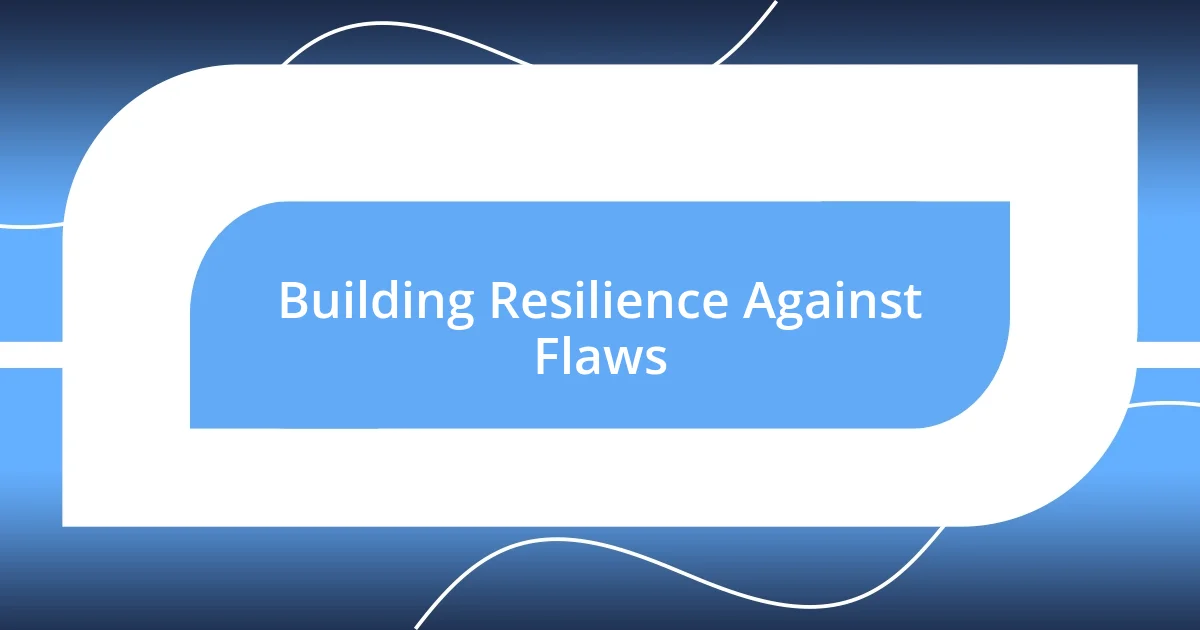
Building Resilience Against Flaws
Building resilience against my character flaws has been an enlightening journey. I recall a time when I faced my deep-seated fear of failure. Instead of withdrawing, I embraced failure as a teacher. I boldly signed up for a public speaking event, despite my anxiety. The sweat and jitters were overwhelming, but with each word I spoke, I built a sense of resilience. I learned that stepping outside my comfort zone can be incredibly empowering, encouraging a mindset shift where failures aren’t ends, but rather stepping stones.
In my experience, cultivating self-compassion has been a powerful tool in this process. I often found myself dwelling on my imperfections, which only deepened my insecurities. But one quiet evening, while reflecting on my struggles, I made a conscious effort to treat myself with kindness. I began speaking to myself as I would with a friend—acknowledging my flaws without harsh judgment. This approach has helped me bounce back more quickly from setbacks, reminding me that everyone has their own battles to fight.
I also can’t overstate the importance of community support in building resilience. When I confided in my friends about my flaws, I discovered I wasn’t alone in my struggles. Sharing openly nourished my emotional well-being and strengthened bonds with others. It made me rethink: how often do we isolate ourselves under the weight of our imperfections? By opening up, I found that vulnerability can lead to profound connections, serving as a reminder that we all have our journeys, and together, we can face our flaws with courage.
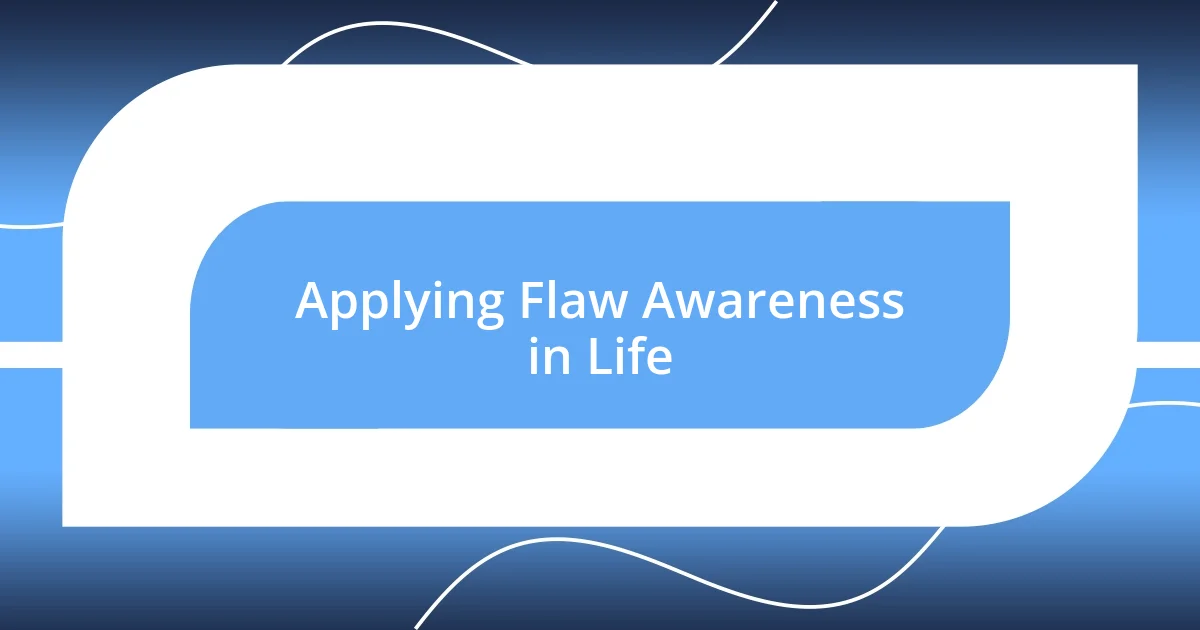
Applying Flaw Awareness in Life
Recognizing and applying flaw awareness in my daily life has been transformative. I remember a time when I would get easily frustrated in heated discussions. Instead of suppressing that frustration, I decided to pause and breathe before reacting. This little habit has not only helped me respond more thoughtfully but has also shown me how my impatience can knock down communication bridges. Isn’t it enlightening to think that a simple pause can change the dynamics of an entire conversation?
Another strategy I’ve embraced is the practice of reflection at the end of the day. Each night, I’ll take a moment to mentally walk through my interactions. Just last week, I noticed moments when my tendency to over-apologize came into play, making me feel small instead of confident. It dawned on me that recognizing this flaw is like turning on a light bulb—I can choose to acknowledge my worth without needing to overcompensate. How freeing it is to let go of that unnecessary burden, right?
Additionally, I actively remind myself to celebrate small victories linked to overcoming my flaws. When I consciously chose to interrupt my habit of being defensive during feedback sessions, I felt an unexpected rush of pride. I vividly recall a colleague complimenting my improved openness, which filled me with such warmth. It’s incredible how these small acknowledgments fuel our journey, isn’t it? They serve as gentle reminders that awareness isn’t just about identifying flaws; it’s about recognizing our growth and the positive changes we can foster.
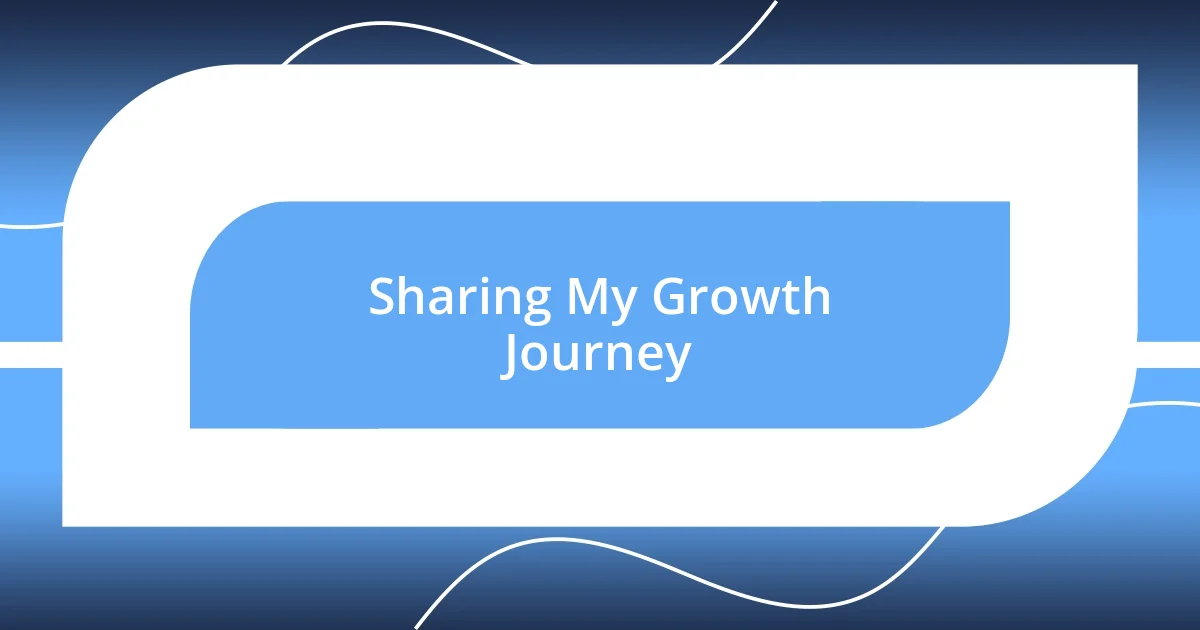
Sharing My Growth Journey
Sharing my growth journey has been an eye-opening adventure filled with ups and downs. I vividly remember a moment when I realized how my fear of rejection held me back from pursuing new friendships. Instead of shying away, I decided to invite someone I admired for coffee. My heart raced as I sent that text, but when we met, I discovered a shared passion for art that sparked an inspiring conversation. This experience showed me how stepping out in honesty can open doors to connections I never thought were possible.
As I navigated my journey, embracing vulnerability became a crucial turning point. One afternoon, while journaling about my experiences, I stumbled upon a recurring theme of perfectionism taking the wheel. I was so bent on doing everything flawlessly that I forgot to enjoy the process. Realizing that imperfection is part of the human experience hit me hard. I now ask myself, “What if I allowed myself to be imperfect?” Embracing those imperfections not only makes life richer but also allows deeper, more authentic connections to blossom.
Another significant aspect of my growth journey has been the importance of setting boundaries. I used to spread myself too thin, thinking that meeting everyone’s expectations would make me more lovable. Through reflection, I began to value my own time and energy. One evening, after declining an invitation to a gathering that would have exhausted me, I felt a rush of relief wash over me. I thought, “This is my life, and my peace matters.” It’s empowering to realize that prioritizing my well-being not only helps me grow but inspires those around me to do the same.












